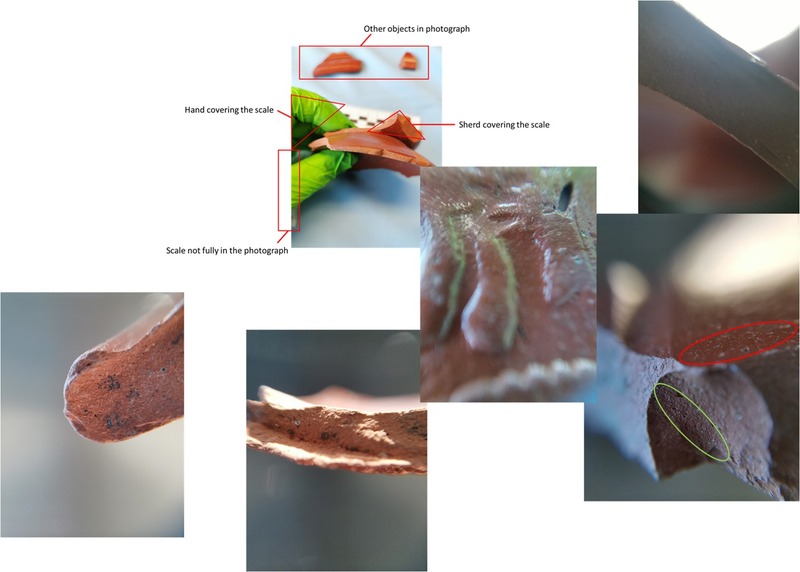Archaeology and Ancient History
News and events
Arch-I-Scan Colloquium and Workshop – Artificial Intelligence and Pottery Identification and Analyses
- College Court, Leicester
- Thursday- Friday 20th-21st April 2023
Marking the approaching end of the Arch-I-Scan project, this colloquium provided a great occasion to discuss progress with project partners and other interested academic and professional archaeologists. PI Pim Allison reflects on the recent Arch-I-Scan Colloquium marking the final stages of the project:
This colloquium and workshop, scheduled as the Arch-I-Scan Project is coming into its final months of AHRC funding, commenced with a meal in the Cradock Arms on the Wednesday evening where some 17 participants, from UK, Spain, Belgium and the USA, meet and got to know each other, or renewed acquaintances, over pleasant pub food and wine.

Tatiana Tyukina details some of the problems confronting automatic rim extraction from photos.
The colloquium proper kicked off on Thursday morning with a detailed explanation from Prof. Ivan Tyukin on the computations behind what AI can and cannot for us archaeologists. Three more AI papers by members of the Arch-I-Scan team – Zedong Zheng, Tatiana Tyukina, and Qinghua Zhou, respectively – on what we are doing with pottery simulation, and with automated rim recording and on the University of Michigan’s spin-off Olynthos project on fabric identification in ancient Greece, and a further maths paper from Danai Kafetzaki on algorithmic approaches to identifying the typology and chronology of red-slip ware remains from Sagalassos, Turkey, completed this section of the colloquium. Some of us archaeologists grasped some of AI and maths approaches behind these papers but I feel the speakers drove home how important it is that we collaborate with people like them when we want to push the boundaries of archaeology’s computational methodologies.
The first section on Thursday afternoon, with papers by Daan van Helden, Fiona Seeley and Lisa Nevett, turned the focus to what the archaeologists involved in the Arch-I-Scan and Olynthos projects have been doing to prepare and record the material – the sherds of terra sigillata and of a range of Greek fabrics – for the AI machine. Very clear messages here were the need to focus on the most efficient and effective recording processes, but also the fundamental importance of community involvement, equally for the success of the recording processes, for the atmosphere around this process, and for the human learning that these opportunities provided for the participants.

An image from a slide from Daan van Helden’s presentation ‘Development and refinement of Arch-I-Scan’s recording processes’, showing that it can be difficult to take perfect pictures.
The next session demonstrated some recent analytical approaches that are bringing us closer to my long-term goal of being able to use Roman pottery assemblages to differentiate different eating and drinking practices through different ranges of vessel forms and fabrics, whether at the provincial level (Alasdair Gilmour), regional and community levels (Pim Allison and Daan van Helden), or the household level (Jesús Bermejo Tirado).
On Friday morning very lively discussion was had both before and after the final paper by Holly Wright (Archaeological Data Service, York University) on the ArchAIDE project and the plans for its follow-on project, Managing Artificial Intelligence in Archaeology (MAIA). This and further discussion sessions centred the availability of data for inter-site analyses, the timing for the availability of the results of the Arch-I-Scan Project to archaeologists in the field and in museum contexts, and also members of the general public, and on possibilities for the creation of more data to continue to improve the accuracy of the AI machine. There is certainly much still to be done here but there would seem to be considerable willingness in this regard, and a number of potential opportunities and options to facilitate the goal of Arch-I-Scan to increase the use of AI technologies in pottery studies.
Throughout the colloquium there was great input from, and interaction among, all participants, including those participating remotely – Nick Cooper and Liz Johnston (ULAS), David Stone (Michigan), Qinghua Zhou (King’s College) and Jeroen Poblome (Leuven). Thanks are due to Victoria Szafara for her exceptional dedication to dealing with all the logistics of putting together a very enjoyable and fruitful colloquium.
On-going research
In January 2024, 12 institutions and professional organisations were awarded c. 5m Euros from the European Research Council’s Horizon CL2 2023 Heritage programme for the project ‘AUTOMated enriched digitisation of Archaeological liThics and cerAmics’. Prof. Ivan Tyukin is one of the investigators on this project and will be further developing the AI processes developed in the Arch-I-Scan Project.